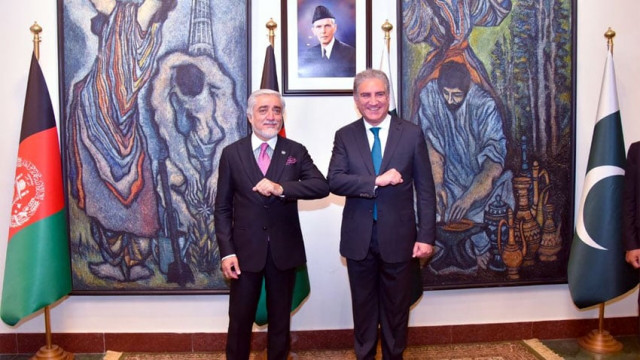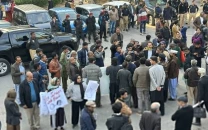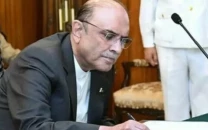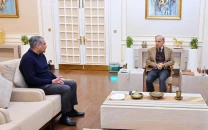Abdullah Abdullah praises Pakistan’s role for Afghan peace
FM Qureshi says past history should not dictate future course of action

Dr Abdullah Abdullah, the head of Afghan High Peace Council for National Reconciliation, on Monday praised Pakistan’s role in facilitating the peace process as he began three-day visit, seen as crucial against the backdrop of an on-going talks between the Afghan government and Taliban.
This is the first high-level visit from Afghanistan in several months, highlighting increased interaction between the two neighbours with prospects of possible political end to the two-decade long war is insight.
Dr Abdullah, who is leading a high-powered delegation, comprising members of high peace council, was received by Prime Minister’s Adviser on commerce Razak Dawood and Pakistan’s Special Representatives for Afghanistan Ambassador Muhammad Sadiq.
Soon after his arrival, he visited the Foreign Office where he held talks with Foreign Minister Shah Mehmood Qureshi. Dr Abdullah will meet Prime Minister Imran Khan, Army Chief General Qamar Javed Bajwa and other senior officials on Tuesday.
It was a pleasure to have welcomed @DrabdullahCE to MoFA. The #AfghanPeaceProcess is of paramount importance for both 🇵🇰 and 🇦🇫 & its success ensures socio-economic prosperity for all. @DrabdullahCE’s visit further strengthens the amity & fraternity between our countries. pic.twitter.com/4EXhRuuV2W
— Shah Mahmood Qureshi (@SMQureshiPTI) September 28, 2020
The talks at the foreign ministry focused on intra-Afghan dialogue, the peace process and bilateral relationship, said Dr Abdullah in a tweet after the meeting. Welcoming Dr Abdullah and his delegation to Pakistan, the foreign minister expressed the hope that his visit would open a new chapter in the bilateral relations, according to the official statement issued by the foreign office.
The foreign minister said that Dr Abdullah Abdullah’s visit will greatly help strengthen relations with Afghanistan and forge a common understanding on the Afghan peace process. Qureshi also extended best wishes to Dr Abdullah Abdullah on steering the peace negotiations to a successful outcome.
Reaffirming Pakistan’s steadfast support to the peace process, Qureshi emphasised that Pakistan had always maintained that there was no military solution to the Afghan conflict and encouraged all parties to reach a political solution through an Afghan-led and Afghan-owned process.
Welcoming the inaugural ceremony of Intra-Afghan Negotiations, held in Doha on September12, Qureshi noted that now it was up to the Afghan leadership to seize this historic opportunity to bring an end to the decades long conflict and secure an inclusive, broad-based and comprehensive political settlement.
The foreign minister underscored Pakistan’s support for a peaceful, stable, united, sovereign and prosperous Afghanistan. He stressed that mistakes of the past should not be repeated; nor past history should dictate the future course of action.
Qureshi underlined that there was a need to guard against the detrimental role of ‘spoilers’, both within and outside Afghanistan, who did not wish to see return of peace in the region.
He also stressed the high importance Pakistan attached to its brotherly relations with Afghanistan. He stated that recently, at the request of the Afghanistan government, Pakistan opened five border crossing-points to facilitate the transit trade, bilateral trade and pedestrian movement.
The foreign minister also highlighted the $1 billion development and capacity-building assistance that Pakistan had extended to support the reconstruction and economic development in Afghanistan.
Emphasising the importance of bilateral economic relations, Qureshi noted that negotiations for Preferential Trade Agreement (PTA) and revision of Afghanistan-Pakistan Transit Trade Agreement (APTTA) would commence soon to optimally utilise “our capacities for mutually beneficial trade and transit”.
The foreign minister stressed that return of Afghan refugees to their homeland with dignity and honour should be part of the peace and reconciliation process.
Highlighting that terrorism was a common threat, the foreign minister emphasised the need for a close cooperation through bilateral institutional mechanisms, including relevant working groups of the APAPPS for effective border management.

1601276793-0/abdullah-(2)1601276793-0.webp)

1601276676-0/abdullah-(1)1601276676-0.webp)




















COMMENTS
Comments are moderated and generally will be posted if they are on-topic and not abusive.
For more information, please see our Comments FAQ